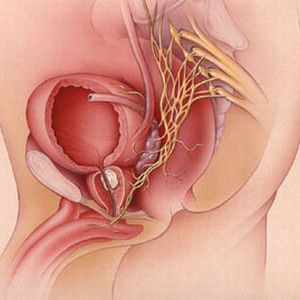 Prostate cancer is the second leading cause of cancer death in men, exceeded only by lung cancer. Adenocarcinoma of the prostate is the clinical term for a cancerous tumor of the prostate gland. As prostate cancer grows, it may spread to the interior of the gland, to tissues near the prostate, to sac-like structures attached to the prostate (seminal vesicles), and to distant parts of the body . Prostate cancer confined to the gland often is treated successfully. Prostate cancer is the second leading cause of cancer death in men, exceeded only by lung cancer. Adenocarcinoma of the prostate is the clinical term for a cancerous tumor of the prostate gland. As prostate cancer grows, it may spread to the interior of the gland, to tissues near the prostate, to sac-like structures attached to the prostate (seminal vesicles), and to distant parts of the body . Prostate cancer confined to the gland often is treated successfully. |
 A man with prostate cancer may not have any symptoms. Symptoms of prostate cancer are often similar to those of benign prostatic hyperplasia (BPH). Men observing the following signs and/or symptoms should see their physician for a thorough examination: A man with prostate cancer may not have any symptoms. Symptoms of prostate cancer are often similar to those of benign prostatic hyperplasia (BPH). Men observing the following signs and/or symptoms should see their physician for a thorough examination:
Symptoms of Prostate Cancer may include:
|
Prostate Cancer Advanced Treatment at World Class Hospitals in India
Men with prostate cancer have many treatment options. The treatment that’s best for one man may not be best for another. Your doctor will make recommendations that are best for each individual. The options include active surveillance (also called watchful waiting), surgery, radiation therapy, cryotherapy, hormone therapy, and chemotherapy. You may have a combination of treatments.
Surgery: Surgery is an option for men with early (Stage I or II) prostate cancer. It’s sometimes an option for men with Stage III or IV prostate cancer. Before the surgeon removes the prostate, the lymph nodes in the pelvis may be removed.. There are several types of surgery for prostate cancer. Each type has benefits and risks. You and your doctor can talk about the types of surgery and which may be right for you:
Robotic laparoscopic surgery: The surgeon removes the entire prostate through small cuts. A laparoscope and a robot are used to help remove the prostate. Instruments are passed through the small cuts and are used to remove the prostate. The surgeon uses handles below a computer display to control the robot’s arms.
- Open surgery: The surgeon makes a large incision (cut) into your body to remove the tumor. There are two approaches:
- Through the abdomen: The surgeon removes the entire prostate through a cut in the abdomen. The incision typically is from the umbilicus (belly button) down to the pelvic bone. This is called a radical retropubic prostatectomy.
- Between the scrotum and anus: The surgeon removes the entire prostate through a cut between the scrotum and the anus. This is called a radical perineal prostatectomy.
Read more about Robotic Laparosciopic Prostate Surgery and Package Cost in India Click here….
Laparoscopic prostatectomy: The surgeon removes the entire prostate through small cuts
Read more about Laparoscopic Prostatectomy & package cost in India Click here…
Laser TURP: A man with advanced prostate cancer may choose TURP (transurethral resection of the prostate) to relieve symptoms. The surgeon inserts a long, thin scope through the urethra. A cutting tool at the end of the scope 
To know more about Prostate Cancer in India please visit this link : https://safemedtrip.com/medical-services/advanced-technology-treatment-in-india/robotic-prostate-cancer-surgery-in-india.html

 Click to WhatsApp
Click to WhatsApp +91-9899993637
+91-9899993637




